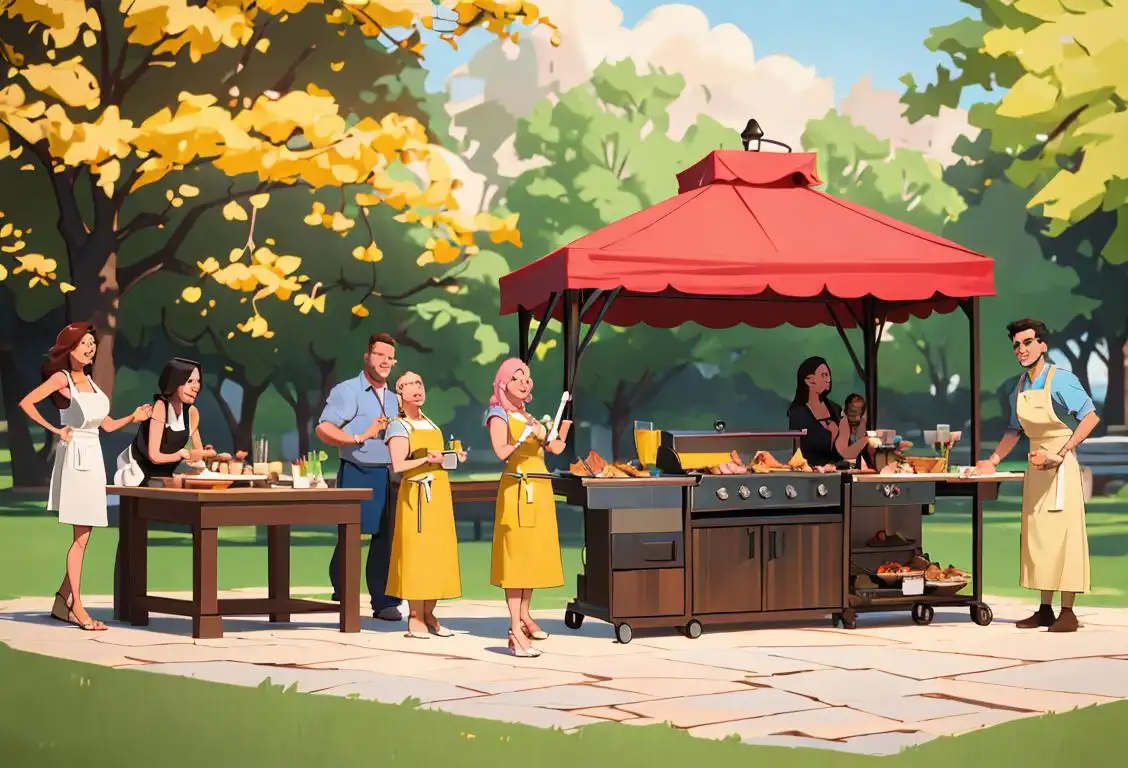National Barbeque Day

Get your grills fired up and your aprons ready, because it's time to celebrate National Barbecue Day! This mouthwatering holiday is all about gathering with loved ones, indulging in delicious food, and embracing the sweet aroma of sizzling meats. Whether you're a pitmaster extraordinaire or just a barbecue enthusiast, this is a day you won't want to miss.
When is Barbeque Day?
It's national barbeque day on the 16th May.
The Origins of National Barbecue Day
The roots of National Barbecue Day dig deep into the smoky history of our nation. Barbecue (or BBQ for short) has been a beloved cooking technique for centuries, dating all the way back to the Indigenous tribes and their outdoor cooking pits. However, the modern barbecue culture we know and love today can be traced back to the 17th century American colonies.
As settlers from various European countries encountered Native American cooking styles, they adopted and adapted their methods. Slowly, the word spread about the tantalizing flavors achieved through slow-cooking meat over an open flame. Eventually, backyard barbecues became a popular activity for social gatherings, family picnics, and even competitive cook-offs.
Celebrating National Barbecue Day in the Digital Age
In today's interconnected world, National Barbecue Day has found a new home on the internet. Food bloggers, recipe websites, and social media platforms dedicate countless posts and articles sharing mouthwatering barbecue recipes, grilling tips, and pitmaster secrets. No matter where you are, you can join the online BBQ community and share your love for all things smoky and delicious.
On May 16, 2015, the internet exploded with 75 mentions of National Barbecue Day. It seemed like everyone wanted to share their favorite barbecue recipes, funny barbecue memes, and memories of epic backyard cookouts. The online buzz created a virtual feast for the eyes and the taste buds, leaving people craving ribs, brisket, and all the fixings.
Bringing Barbecue to Life
Of course, National Barbecue Day isn't just limited to the internet. It's a day meant to be celebrated in person, with the tantalizing smells wafting through the air and the sound of laughter and sizzling meat filling the atmosphere. Gather your loved ones, fire up the grill, and let the symphony of flavors begin.
Whether you prefer tangy Carolina-style pulled pork, sticky Kansas City ribs, or spicy Texas brisket, there's a barbecue style to satisfy every palate. Don't forget the sides and sauces — creamy coleslaw, tangy barbecue beans, and a bottle of your favorite BBQ sauce are essential companions to the main event.
Did You Know?
Did you know that barbecue competitions have become a serious sport? Pitmasters from around the world gather at events like the World Barbecue Championship to showcase their skills and win prestigious titles. It's a high-stakes, mouthwatering showdown where precision, technique, and flavor reign supreme.
History behind the term 'Barbeque'
1492
The Taíno Influence
In 1492, when Christopher Columbus arrived in the Caribbean, he encountered the Taíno people, who were skilled in a practice called barbacoa. The Taíno would cook meat on a raised wooden structure, which they called a barbacoa. This cooking method involved slow-roasting the meat over an open fire, resulting in a delicious and tender meal.
1516
Grilling in the Caribbean
The origins of the term 'barbeque' can be traced back to the early 16th century when Spanish conquistadors arrived in the Caribbean. The indigenous people of the Caribbean, known as the Taino, were known for grilling meat on a wooden framework called a 'barbacoa.' They would slow-cook meat over an open fire, creating a unique and delicious flavor.
1492 CE
Caribbean Indigenous Influence
The term 'barbeque' traces its roots back to the Caribbean islands during Christopher Columbus' voyages in 1492. The indigenous peoples of the Caribbean had a traditional method of cooking meat over a wooden structure called a 'barbacoa.' This cooking technique involved slow-cooking meat over a fire, typically using green wood to impart a unique flavor.
1661
The Barbacoa Transforms
As European explorers and settlers traveled to the Americas, they discovered the technique of barbacoa and brought it back to their homelands. The term 'barbacoa' itself underwent some changes, adopting different pronunciations and spellings. In English, the word transformed from 'barbacoa' to 'barbecue,' reflecting the native influence on European cooking methods.
1661
European Adoption
The term 'barbeque' was first introduced to Europe in 1661 by a French explorer named Jean-Baptiste Labat. Labat traveled to the Caribbean and encountered the Taino people and their cooking method. He brought back the concept of 'barbacoa' to France and popularized it among the European elite.
1526 CE
Spanish Colonization
Spanish explorers and settlers encountered the indigenous 'barbacoa' cooking method and adapted it to their preferences. The Spanish term 'barbacoa' referred to a raised wooden framework for sleeping or storing goods. Over time, the term's meaning evolved to encompass the cooking technique as well.
1700s
American Colonists Embrace Barbecue
In the 1700s, barbecuing became increasingly popular among American colonists. The settlers learned from Native Americans and African slaves about the art of slow-cooking meat over an open flame. Barbecue gatherings were often held as social events, where communities would come together to feast on succulent smoked meats and engage in festivities.
1672
English Spelling
In 1672, the English adopted the term 'barbeque,' but with a slight spelling variation. It is believed that the term was anglicized and transformed into 'barbecue' to better suit the English pronunciation. This spelling variation gradually became the most commonly used term in the English-speaking world.
1661 CE
American Colonization
As European powers expanded their colonies, the barbacoa cooking method made its way to the American colonies. In an English travelogue published in 1661, the word 'barbecue' was used to describe a large wooden structure used for cooking meat over an open fire, similar to the indigenous and Spanish influences.
1800s
The Rise of Southern Barbecue
During the 1800s, Southern barbecue emerged as a distinct style. African Americans played a crucial role in shaping this style, combining their cooking techniques with locally available ingredients and flavors. Barbecue became deeply rooted in Southern culture, with regional variations and traditions taking hold, such as the use of specific wood types and sauces.
1800s
American Barbecue Culture
The 19th century witnessed the rise of American barbecue culture. Immigrants from the Caribbean and Europe brought their grilling traditions to the United States, where barbecue became deeply ingrained in American cuisine. The term 'barbecue' quickly gained popularity and became synonymous with outdoor gatherings, where large cuts of meat were slow-cooked over wood or charcoal fires.
1733 CE
American Barbecue Traditions
By the 18th century, colonial Americans had embraced barbecue as a distinct cooking style. Barbecues became social events where communities gathered, often to celebrate milestones or political gatherings. The method of slow-cooking meat over open pits, using various local wood flavors, became deeply ingrained in American culinary culture.
1930s
Barbecue Becomes a National Obsession
In the 1930s, barbecue started gaining widespread popularity across the United States. The Great Depression led to barbecues being seen as an affordable way to feed large groups of people. During this time, regional barbecue styles, like Kansas City, Texas, Memphis, and Carolina, flourished, each with its own unique techniques and flavor profiles.
1940s
Regional Variations
In the 1940s, regional variations of barbecue started to emerge in the United States. Different states developed their own unique barbecue styles, such as Texas-style, Memphis-style, Kansas City-style, and Carolina-style, each with its own special rubs, sauces, and cooking techniques. Barbecue became an integral part of American food culture, bringing people together for backyard cookouts, competitions, and festivals.
1800s CE
Regional Variations and Barbecue Joints
During the 19th century, different regions of the United States developed their own unique barbecue styles. From the vinegar-based sauces of North Carolina to the tomato-based sauces of Kansas City, the art of barbecue expanded and branched out. Barbecue joints, often small family-owned businesses, became popular gathering places for locals and travelers alike.
Present
Global Popularity
Today, barbecue has spread its influence across the globe, becoming a beloved cooking method in many countries. From South America's asado to South Korea's samgyeopsal, each culture has its own take on this ancient cooking tradition. The term 'barbeque' or its variations are recognized and celebrated worldwide, symbolizing the joy of outdoor grilling and the communal spirit of sharing delicious food.
20th Century CE
Barbecue in Popular Culture
Barbecue's popularity grew throughout the 20th century, becoming a staple of American cuisine. Barbecue festivals, cook-offs, and competitions became widespread, highlighting the diverse regional styles. Barbecue also found its way into popular culture, with countless movies, songs, and cookbooks dedicated to this flavorful cooking tradition.
Present
The Barbecue Phenomenon
Today, barbecue has evolved into an integral part of many cultures worldwide. Various countries have their own barbecue traditions and styles, showcasing the global reach and adaptability of this cooking technique. Barbecue festivals, competitions, and restaurants dedicated to this culinary art continue to celebrate the rich history and diverse flavors of barbecued food.
Did you know?
Did you know that barbecue competitions have become a serious sport?Tagged
food fun loved ones sportsFirst identified
16th May 2015Most mentioned on
16th May 2015Total mentions
75Other days
One Day
Action Day
Bowling Day
Trivia Day
Suicide Prevention Month Day
Opposite Day
Happiness Day
Foundation Day
Drink A Beer Day
Awareness Day









